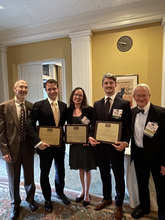
Chris Odinet, the Josephine R. Witte Professor of Law, and co-authors received the Grant Gilmore Award for their article published in the Arizona State Law Review entitled, “The Private Law of Stablecoins.”
The Grant Gilmore Award honors superior writing in the field of commercial finance law and is awarded by the American College of Commercial Finance Lawyers. The award is named after Grant Gilmore, a Yale Law professor and principal drafter of the Uniform Commercial Code.
Odinet's co-authors include Kara J. Bruce, professor of law at the University of Oklahoma College of Law and Andrea Tosato, associate professor in commercial law at the University of Nottingham School of Law and visiting associate professor at the University of Pennsylvania Carey Law School.
We caught up with Professor Odinet for a Q&A:
Q: Why is excellent writing so important in legal research? And specifically in commercial finance law?
A: Writing with clarity is important in any discipline, but I think it’s particularly important in law because the ability to convey legal rules and their application to real world facts is critical to the maintenance of the rule of law.
If people can’t understand what the law is (and thus what they can and cannot do), then eventually they may find it not worth following the law.
Civil society only works when the law is clear and understandable. To that point, commercial finance is an area that is often criticized for being difficult to understand, largely because it exists within business relationships. The details of those relationships and the transactions that spring from them are often foreign to most people, which makes the terms and structures seems incomprehensible.
But here again, it’s important to know the rules of game (that is to say, the rules of the economy) in order to make sure it’s played fairly—to make sure you’re not taken advantage of and that you know the consequences of the deals that you make.
I try to focus on that in my own scholarship: which is to say, writing clearly about complex financial issues so that what is often seen as scary and too complicated is actually made accessible. Once you understand the world of financial transactions, you can be more easily interrogate them.
Q: How did you learn/improve on your legal writing early in your career?
A: Like most law students, I came to law school thinking that complex sentences and flowery language was the stuff of lawyers and the law. That’s just not true, and it shouldn’t be true.
Clear, concise writing that conveys your ideas in a way that anyone can pick up, read, and understand should be the goal anytime you put pen to paper. The law is no different.
I remember when I was working on my law review student paper as a 2L, I wrote a whole draft using what I can only imagine now was the most arcane and poorly constructed prose imaginable—thinking that it would “sound smart.”
The professor who was my paper advisor (and ultimately my mentor in becoming a law professor) took a red pen and struck through whole pages. She wrote: “no one talks like this; rewrite” all over that paper. And she was so right!
That message never left me: “no one talks like this, so don’t write like this either.” And I never did again!
Q: Tips for current law students interested in legal scholarship?
A: If you’re interested in legal scholarship, then make it your business to read legal scholarship.
There’s definitely a certain formula to a law review article, but you’ll also very quickly pick up good writing from mediocre writing from bad writing. You’ll also learn how to construct an argument, provide necessary background information, problematize an issue, and develop persuasive solutions. All of these are the elements of a complete piece of legal scholarship.
But, it all starts with reading.
